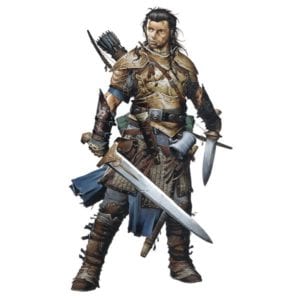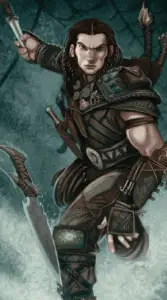Warriors, rogues and mages. Most people who have played any role-playing games, particularly of the video variety, are familiar with those words. We take them for granted as basic building blocks for traditional fantasy games. And yet, are they? Or rather, should they be? Are they really useful to us? I don’t think they are, and I’ll try to elaborate. If it sounds incredibly specific to you… that is what I am for, I suppose.
Now, here at the outset I should mention that what I’m talking about applies more to video games than tabletop games. The latter have largely moved away from this model, except for Dungeons and Dragons (D&D), which holds on to it despite having many more classes. But every so often, I see people claim that it’s worthwhile, and I don’t really think it is. And there are still some systems that do use it, whether because they imitate D&D or for some other reason.
Let’s start by asking a question – why do we even use classes in games? There are many answers to this question, and once again they depend on what kind of game we’re even talking about. I’ll simply answer them as I see them.
The purpose, in my view, is mainly ease of use. This is particularly important in video games, where it’s much easier for players to tick a box than try to figure out who they want to play and juggle dozens of options.
The other one is a bit trickier. I’m not sure how much I believe it, really. But having classes lets us introduce stronger themes and more definition to our characters. Having a “paladin” class that swears oaths and derives power from them is different than just picking some fighting skills, some support and healing magic, and calling ourselves a paladin. I’m not going to say you need classes for this, but they do help and it’s a reason why people like them.
The Warrior

This one really shouldn’t be much of a question. Everyone knows what a warrior is, right? What would fantasy, especially fantasy gaming, be without people who go and hit things with weapons? And, well, that’s just the thing. To call someone a “warrior” in a fantasy game is to say practically nothing.
After all, don’t most fantasy protagonist fight, especially in games? Many of them will use weapons, too, unless they rely on magic entirely. So what defines a warrior? Most would say it’s a focus on combat as a way of life and their main approach to challenges or problems.
Seems sensible, but it brings us to a fairly common problem, namely, the image of a warrior who’s a big, dumb door-opener incapable of tying their shoelaces. Now obviously it’s not a hard archetype to find in fiction, but pushing players into playing them is still questionable.
In some contexts, particularly video games, the “warrior” class has a tendency to revolve around heavy armor, heavy weapons, and being a brick wall between your allies and your enemies. Or just a brick wall, if you don’t happen to have allies. This cuts out a great deal of possible space that might belong to the “warrior” class. It’s usually shuffled off to the rogue class, which doesn’t help, as I’ll outline below.
The warrior class thus ends up both too broad and too narrow, if you can believe that. It’s so conceptually broad as to not mean much; in practice it can only cover so much, because of brutal necessities of resource management.
If it does try to cover everything, as the D&D fighter class has been moving towards, well, why do we have classes to begin with? If we get a blank slate “martial” character that we customize by picking different abilities, seems to me like we’re playing a point-buy game with extra steps. But the warrior’s non-combat skills still often suffer for it. As, again, we see in D&D time and again. It seems the second edition of Pathfinder might finally break the curse. But it also proudly displays the other problem—the class has no identity and merely serves as a toolbox.
The Rogue

The elusive rogue class. Elusive in more ways than one, really. We could say the rogue class began its life as the old-timey D&D thief, but I’m always wary of making such statements about the old games. It’s not like I’m very familiar with them. Either way, it’s grown since then. Or has it?
I don’t think it has, really, which is the whole problem. Now, the archetype of a thief, burglar, and generally someone who can get to places without ever being seen exists for a reason. The problem is that while the rogue might have started this way, it’s no longer just that. This baggage hangs over it nonetheless.
Consider what I said about warriors above. They trend towards two things: focusing on combat skills and heavy armament. Therefore, rogues should focus on non-combat skills and light armor. Sounds nice in theory, but practice doesn’t quite follow suit.
You see, while I accused the warrior archetype of not really meaning anything, the rogue has it far worse. In too many cases, it has to cover every concept more subtle than a man in full plate smashing everything with a heavy sword as big as he is. After all, that’s how two-handed weapons work. Everything more subtle in combat or out of it has to be a rogue.
Which, well, it really can’t be without becoming even more of a “point-buy with extra steps” class than the warrior. There’s just too many concepts that aren’t actually that close to one another. To say nothing of the line being blurry. And yet, often-times I don’t really see the rogue class even try. It skips over all this grey area and hangs onto the thief-shaped baggage. They use stealth and the melee weapons they wield tend to be daggers.
Thus, much like with warriors, we have two sort of opposite problems. The rogue class, too, is broad in concept but very narrow in practice. If someone isn’t combat-focused or heavy-weight enough, they’re clearly a rogue. And yet, they can’t be a rogue either unless they use stealth and stab people.
This creates a large swath of character concepts that the warrior/rogue/mage model doesn’t cover. Take Geralt of Rivia, for instance. Is he a warrior? Probably, but he uses light armor and knows a lot about alchemy, not to mention Signs. He thus hangs awkwardly between those two concepts. Even D&D has a better place for him as a ranger, or it would if so many of its editions didn’t insist that rangers must either shoot a bow or dual-wield. But D&D classes are a topic for another day.
Or take Conan, the ultimate barbarian hero and one of the first fantasy protagonist there ever were. Is he a warrior? Surely, since he performs great feats of martial prowess. But he’s also an accomplished thief and burglar, able to move as quietly as a prowling cat. So I suppose he’s a warrior with some thief skills. And if a warrior can learn stealth to such a degree, what does that make the rogue? It only counts if you leap out of stealth to sink a dagger in someone’s back?
In a similar vein, rogues eclipse characters who specialize in non-combat and non-magical skills but aren’t stealthy. Sages, explorers, diplomats…they all have to bear the baggage if they want to be rogues. Of course, here we also run head-first into how absolutely arbitrary the combat/non-combat distinction is. But here we must also remember that in video games, it’s inevitable as they will likely focus on combat much more.
Let’s be clear that there’s nothing wrong with the archetype of a thief or assassin who relies on stealth to either steer clear of danger or deal lethal strikes. But that’s not the only alternative to what the warrior has become. And yet, it very often is, because the middle ground I described doesn’t seem to exist.
The Mage

Mages occupy a different spot than the other two “classics.” They use magic, which sets them apart. And magic does work differently in different games. Thus it’s somewhat trickier to discuss. But is their use of magic distinct enough?
The answer, as it so often happens, is “it depends.” While the abilities of characters who fall into the warrior and rogue molds are somewhat predictable, mages can be many things. Once again, we must consider whether we’re talking about video or tabletop games. In the former, mages often fall into an “Area of Effect (AoE) damage and healing” routine. In tabletop games, their abilities can be broader, running into the balance issues that come with it.
Magic is distinct enough from mundane skill that separating mages looks more natural. In some games, like the Dragon Age series, being a mage is a distinct status. You either have magic or you do not. And yet, in that very same series, all the possible potential of magic boils down to “stand in the back and wave a stick to make magic happen.”
Mages are also often arbitrarily barred from more mundane forms of skill, but here we walk the fine line of balance between them and the others. Letting mages do too much bears the risk of making them superior to the other characters, something that can happen regardless.
Of course, as always we have to consider resources and time. It would be nice to have different ways to portray different forms of magic, but there’s only so much game designers can create, balance, and test.
We spent some time talking about how warriors and rogues mix, but what about mages? Here, once again, there’s no one answer. Mixing magic with mundane skill is often reserved for very specific archetypes, like “spellsword.” “nightblade,” or other similar types. Not always, of course. But it’s hard to argue that there’s a tendency to fence off magic skills somewhat. Games that let us learn magic freely often don’t use classes at all. Though the warrior/rogue/mage model sadly exists even in games that offer free character development.
Bringing it together
Having outlined all those problems, what do I think it adds up to? The warrior/rogue/mage model is, in short, both too many and too few classes. If they’re strongly defined, it gets us stuck in the “warrior tanks, rogue stabs or shoots, mage does AoE and healing” rut or something similar. If they’re not, they end up not meaning much. Getting diverse character concepts out of just these three requires multiclassing, subclasses, poaching features, or other means that make you wonder about the purpose of it all. Why not just dispense with it and build our characters from scratch?
Moreover, I cannot help but see these three categories as artificial as time goes by. They don’t really portray anything but themselves. It’s a feedback loop at this point, with warrior/rogue/mage trio being accepted as the way of things even as they constrain our imagination.
What else would I do? That’s a big question. Ideas are, of course, cheap. But even if you look at a game like League of Legends, I think it manages to have broad categories of characters without falling into those traps. Bearing in mind, of course, that it’s a MOBA and thus its lessons mostly apply to similar games. Nonetheless, if we want classes rather than a more freeform type of advancement, more of them but with some actual weight seem like a better solution. D&D has moved in that direction… and done so poorly, but still.
If we do want very few, broad classes rather than specific ones or no classes at all, why stick to this warrior/rogue/mage model? Why not try something like strong hero, quick hero, and smart hero? Those are actual fictional archetypes that we see again and again.
I know the three are classic and they’re not going anywhere. And I know people like them. But I wouldn’t be myself if I didn’t try to poke holes in tried and true archetypes like that. I hope I gave you some food for thought.

